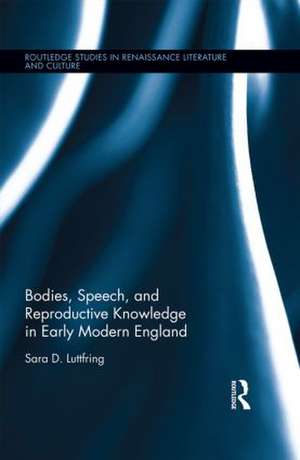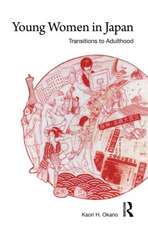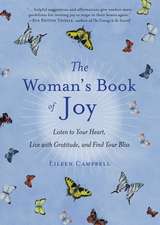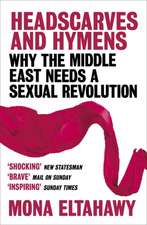Bodies, Speech, and Reproductive Knowledge in Early Modern England: Routledge Studies in Renaissance Literature and Culture
Autor Sara D. Luttfringen Limba Engleză Hardback – 27 iul 2015
| Toate formatele și edițiile | Preț | Express |
|---|---|---|
| Paperback (1) | 394.51 lei 43-57 zile | |
| Taylor & Francis – 10 dec 2019 | 394.51 lei 43-57 zile | |
| Hardback (1) | 1055.51 lei 43-57 zile | |
| Taylor & Francis – 27 iul 2015 | 1055.51 lei 43-57 zile |
Din seria Routledge Studies in Renaissance Literature and Culture
-
 Preț: 326.26 lei
Preț: 326.26 lei -
 Preț: 714.58 lei
Preț: 714.58 lei -
 Preț: 310.09 lei
Preț: 310.09 lei -
 Preț: 485.40 lei
Preț: 485.40 lei -
 Preț: 339.89 lei
Preț: 339.89 lei -
 Preț: 446.95 lei
Preț: 446.95 lei - 18%
 Preț: 1053.95 lei
Preț: 1053.95 lei -
 Preț: 443.65 lei
Preț: 443.65 lei - 18%
 Preț: 1001.90 lei
Preț: 1001.90 lei - 18%
 Preț: 1110.77 lei
Preț: 1110.77 lei -
 Preț: 278.46 lei
Preț: 278.46 lei - 18%
 Preț: 1109.21 lei
Preț: 1109.21 lei - 18%
 Preț: 1053.16 lei
Preț: 1053.16 lei -
 Preț: 389.38 lei
Preț: 389.38 lei - 31%
 Preț: 763.81 lei
Preț: 763.81 lei -
 Preț: 440.97 lei
Preț: 440.97 lei - 31%
 Preț: 764.62 lei
Preț: 764.62 lei - 17%
 Preț: 321.08 lei
Preț: 321.08 lei - 26%
 Preț: 765.01 lei
Preț: 765.01 lei -
 Preț: 433.26 lei
Preț: 433.26 lei - 18%
 Preț: 1062.26 lei
Preț: 1062.26 lei - 18%
 Preț: 1111.40 lei
Preț: 1111.40 lei - 18%
 Preț: 1105.24 lei
Preț: 1105.24 lei - 18%
 Preț: 1057.13 lei
Preț: 1057.13 lei - 18%
 Preț: 1061.22 lei
Preț: 1061.22 lei - 18%
 Preț: 1138.65 lei
Preț: 1138.65 lei -
 Preț: 387.49 lei
Preț: 387.49 lei - 18%
 Preț: 1053.92 lei
Preț: 1053.92 lei -
 Preț: 487.19 lei
Preț: 487.19 lei - 31%
 Preț: 762.57 lei
Preț: 762.57 lei -
 Preț: 416.22 lei
Preț: 416.22 lei - 18%
 Preț: 1111.55 lei
Preț: 1111.55 lei - 18%
 Preț: 1040.35 lei
Preț: 1040.35 lei - 18%
 Preț: 1000.27 lei
Preț: 1000.27 lei - 30%
 Preț: 847.73 lei
Preț: 847.73 lei - 30%
 Preț: 851.75 lei
Preț: 851.75 lei - 18%
 Preț: 1050.09 lei
Preț: 1050.09 lei - 31%
 Preț: 765.77 lei
Preț: 765.77 lei
Preț: 1055.51 lei
Preț vechi: 1287.22 lei
-18% Nou
Puncte Express: 1583
Preț estimativ în valută:
202.04€ • 219.53$ • 169.82£
202.04€ • 219.53$ • 169.82£
Carte tipărită la comandă
Livrare economică 21 aprilie-05 mai
Preluare comenzi: 021 569.72.76
Specificații
ISBN-13: 9781138849426
ISBN-10: 1138849421
Pagini: 246
Ilustrații: 12 black & white halftones
Dimensiuni: 152 x 229 x 18 mm
Greutate: 0.48 kg
Ediția:1
Editura: Taylor & Francis
Colecția Routledge
Seria Routledge Studies in Renaissance Literature and Culture
Locul publicării:Oxford, United Kingdom
ISBN-10: 1138849421
Pagini: 246
Ilustrații: 12 black & white halftones
Dimensiuni: 152 x 229 x 18 mm
Greutate: 0.48 kg
Ediția:1
Editura: Taylor & Francis
Colecția Routledge
Seria Routledge Studies in Renaissance Literature and Culture
Locul publicării:Oxford, United Kingdom
Public țintă
Postgraduate and UndergraduateCuprins
1. Representing Female Reproductive Bodies and Women’s Speech in Early Modern England 2. The Politics of Virginity in The Changeling and the Essex Divorce 3. Pregnancy, Interiority, and the Circulation of Knowledge in Early Modern Medical Treatises and ‘Tis Pity She’s a Whore 4. Birthing Room Speech and the Construction of Patriarchal Authority in A Chaste Maid in Cheapside and Early Modern Gossip Satire 5. Parental Influence and (De)Formative Speech in Early Modern Monstrous Birth Pamphlets and The Winter’s Tale
Recenzii
"Luttfring makes a significant contribution to contemporary understandings of representations of early modern reproduction by arguing that through their "bodily narratives" women played a role in the formation of patriarchal identities during the early Stuart through the Interregnum periods." --Kathleen Kalpin Smith, University of South Carolina, Aiken, USA
Descriere
This volume examines early modern representations of women’s reproductive knowledge through new readings of plays, monstrous birth pamphlets, medical treatises, court records, histories, and more, which are often interpreted as depicting female reproductive bodies as passive, silenced objects of male control and critique. Luttfring argues instead that these texts represent women exercising epistemological control over reproduction through the stories they tell about their bodies and the ways they act these stories out, combining speech and physical performance into what Luttfring calls 'bodily narratives.' The power of these bodily narratives extends beyond knowledge of individual bodies to include the ways that women’s stories about reproduction shape the patriarchal identities of fathers, husbands, and kings. In the popular print and theater of early modern England, women’s bodies, women’s speech, and in particular women’s speech about their bodies perform socially constitutive work: constructing legible narratives of lineage and inheritance; making and unmaking political alliances; shaping local economies; and defining/delimiting male socio-political authority in medical, royal, familial, judicial, and economic contexts. This book joins growing critical discussion of how female reproductive bodies were used to represent socio-political concerns and will be of interest to students and scholars working in early modern literature and culture, women’s history, and the history of medicine.













